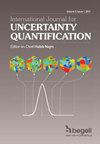Analysis of the Challenges in Developing Sample-Based Multi-fidelity Estimators for Non-deterministic Models
IF 1.8
4区 工程技术
Q2 ENGINEERING, MULTIDISCIPLINARY
International Journal for Uncertainty Quantification
Pub Date : 2024-03-01
DOI:10.1615/int.j.uncertaintyquantification.2024050125
引用次数: 0
Abstract
Multifidelity (MF) Uncertainty Quantification (UQ) seeks to leverage and fuse information from a collection of models to achieve greater statistical accuracy with respect to a single-fidelity counterpart, while maintaining an efficient use of computational resources. Despite many recent advancements in MF UQ, several challenges remain and these often limit its practical impact in certain application areas. In this manuscript, we focus on the challenges introduced by non-deterministic models to sampling MF UQ estimators. Non-deterministic models produce different responses for the same inputs, which means their outputs are effectively noisy. MF UQ becomes complicated by this noise since many state-of-the-art approaches rely on statistics, e.g., the correlation among models, to optimally fuse information and allocate computational resources. We demonstrate how the statistics of the quantities of interest, which impact the design, effectiveness, and use of existing MF UQ techniques, change as functions of the noise. With this in hand, we extend the unifying Approximate Control Variate framework to account for non-determinism, providing for the first time a rigorous means of comparing the effect of non-determinism on different multifidelity estimators and analyzing their performance with respect to one another. Numerical examples are presented throughout the manuscript to illustrate and discuss the consequences of the presented theoretical results.为非确定性模型开发基于样本的多保真度估计器的挑战分析
多保真度不确定性量化(Multifidelity (MF) Uncertainty Quantification, UQ)旨在利用和融合来自一系列模型的信息,以达到比单保真度模型更高的统计精度,同时保持计算资源的有效利用。尽管多保真度不确定性量化最近取得了许多进展,但仍存在一些挑战,这些挑战往往限制了其在某些应用领域的实际影响。在本手稿中,我们将重点讨论非确定性模型给采样 MF UQ 估计器带来的挑战。非确定性模型会对相同的输入产生不同的响应,这意味着它们的输出实际上是有噪声的。MF UQ 因这种噪声而变得复杂,因为许多最先进的方法都依赖于统计数据,例如模型之间的相关性,来优化信息融合和计算资源的分配。我们展示了影响现有中频统一质量技术的设计、有效性和使用的相关量的统计数据是如何随着噪声的变化而变化的。有鉴于此,我们扩展了统一的近似控制变量框架,以考虑非确定性,首次提供了一种严格的方法来比较非确定性对不同多保真度估计器的影响,并分析它们彼此的性能。手稿中还列举了一些数字实例,以说明和讨论所提出的理论结果的后果。
本文章由计算机程序翻译,如有差异,请以英文原文为准。
求助全文
约1分钟内获得全文
求助全文
来源期刊

International Journal for Uncertainty Quantification
ENGINEERING, MULTIDISCIPLINARY-MATHEMATICS, INTERDISCIPLINARY APPLICATIONS
CiteScore
3.60
自引率
5.90%
发文量
28
期刊介绍:
The International Journal for Uncertainty Quantification disseminates information of permanent interest in the areas of analysis, modeling, design and control of complex systems in the presence of uncertainty. The journal seeks to emphasize methods that cross stochastic analysis, statistical modeling and scientific computing. Systems of interest are governed by differential equations possibly with multiscale features. Topics of particular interest include representation of uncertainty, propagation of uncertainty across scales, resolving the curse of dimensionality, long-time integration for stochastic PDEs, data-driven approaches for constructing stochastic models, validation, verification and uncertainty quantification for predictive computational science, and visualization of uncertainty in high-dimensional spaces. Bayesian computation and machine learning techniques are also of interest for example in the context of stochastic multiscale systems, for model selection/classification, and decision making. Reports addressing the dynamic coupling of modern experiments and modeling approaches towards predictive science are particularly encouraged. Applications of uncertainty quantification in all areas of physical and biological sciences are appropriate.
 求助内容:
求助内容: 应助结果提醒方式:
应助结果提醒方式:


